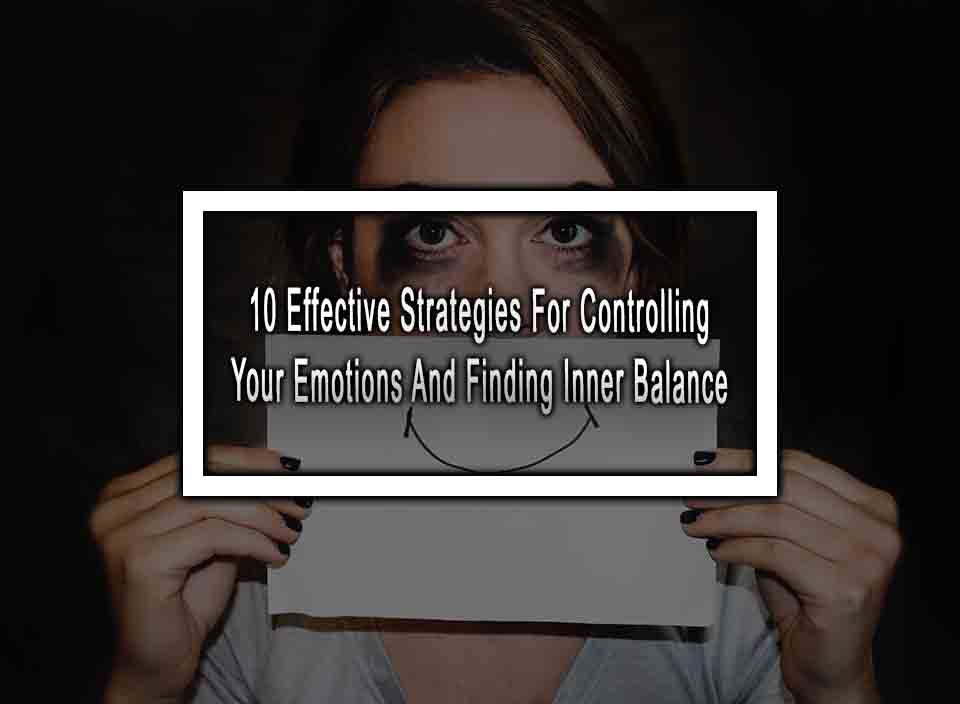Table of Contents
ToggleControlling Your Emotions: Emotions Run Wild? Tame Them with These Game-Changing Strategies!
Are your emotions sometimes reminiscent of a wild rollercoaster ride sans a safety harness? Do you wish you had a magic wand to control your anger, sadness, or anxiety? Well, fret not! We’ve curated a fantastic list of 10 tried-and-tested methods to help you regain control over your emotions and find inner balance. From practicing mindfulness to embracing self-care rituals, let’s embark on this exhilarating journey toward emotional mastery!
1. Master the Art of Mindfulness
In a world marked by constant distractions, mastering the art of mindfulness can be a game-changer. Discover how moment-to-moment awareness can help you observe and acknowledge your emotions without being overwhelmed by them.
2. Embrace the Power of Deep Breathing
When stress starts to take over, deep breathing techniques can come to your rescue. Uncover the incredible benefits of conscious breathing exercises that can calm your mind, slow down your racing thoughts, and restore emotional equilibrium.
3. Identify and Challenge Negative Thoughts
Negative thoughts can wreak havoc on your emotional well-being. Learn how to recognize and challenge these harmful thought patterns, replacing them with more positive and empowering beliefs.
4. Find Joy in Gratitude
Practicing gratitude is like sunshine for the soul. Discover how a simple gratitude journal or daily gratitude practice can shift your focus from negativity to appreciation, instantly boosting your emotional state.
5. Cultivate Self-Compassion
We often tend to be our own harshest critics. Cultivating self-compassion involves treating yourself with kindness, understanding, and forgiveness. Explore practical ways to nourish your self-esteem and practice self-compassion in daily life.
6. Engage in Regular Exercise
Physical activity isn’t just beneficial for your physical health; it’s a potent tool for emotional regulation too. Dive into the science-backed benefits of exercise and explore different workout options that suit your interests and lifestyle.
7. Lean on a Supportive Network
Having a strong support system can significantly impact your emotional well-being. Discover the importance of surrounding yourself with positive, uplifting individuals who can lend a listening ear or offer guidance during challenging times.
8. Practice Mindful Productivity
Productivity and emotional well-being go hand in hand. Embrace effective time management techniques, set realistic goals, and cultivate healthy work-life boundaries to ensure you’re not overwhelmed by stress or negative emotions.
9. Pursue Creative Outlets
Expressing yourself through creative outlets is a fabulous way to channel and release your emotions. Unleash your artistic side by exploring activities like painting, writing, dancing, or playing an instrument.
10. Prioritize Self-Care Rituals
Self-care isn’t selfish; it’s a necessary component of emotional regulation. Discover the joy of pampering yourself with activities that rejuvenate your mind, body, and soul, whether it’s taking bubble baths, meditating, or treating yourself to your favorite hobbies.
Conclusion
Congratulations, emotional warrior—it’s time to take charge of your feelings, toss away the metaphorical safety harness, and embrace life’s exhilarating rollercoaster ride! By implementing these 10 effective strategies for controlling your emotions, you’ll effortlessly discover a newfound sense of inner balance and emotional harmony. Remember, the key lies in practicing mindfulness, self-care, and self-compassion. So buckle up, enjoy the transformative journey, and savor the power of emotional mastery!
Controlling Your Emotions FAQ
Here are the most common questions about controlling your emotions.
1. How can I control my emotions in difficult or stressful situations?
There are several strategies you can use to control your emotions in difficult or stressful situations. Some techniques include deep breathing exercises, taking a break to collect your thoughts, reframing negative thoughts into positive ones, and practicing mindfulness or meditation.
2. Can I completely eliminate negative emotions?
While it may not be possible to completely eliminate negative emotions, you can learn to manage them effectively. This involves understanding and acknowledging your emotions, identifying triggers, and implementing strategies to regulate and redirect negative emotions in a healthy way.
3. How can I avoid letting my emotions affect my decision-making?
One way to avoid letting your emotions affect your decision-making is to take a step back and evaluate the situation objectively. Try to separate your emotions from the facts and consider the potential consequences of different choices. Seeking input from others or using logical reasoning can also help you make more rational decisions.
4. Is it healthy to suppress or ignore my emotions?
Suppressing or ignoring your emotions is not healthy in the long run. While it may temporarily help you cope in certain situations, repressing emotions can lead to increased stress, anxiety, and difficulty in relationships. It is important to acknowledge and express your emotions in a healthy way, such as talking to a trusted friend or seeking professional help if needed.












